
PROOF MAGAZINE
ISSUE 6 – THE OTHER ONES ISSUE – OUT NOW – £15
Click here to browse Issue 4
Click here to browse Issue 3
Click here to browse Issue 2
Click here to browse Issue 1 (SOLD OUT)
BUY ISSUES 3, 4, 5 and 6 FOR JUST £25
CHOOSE YOUR ISSUE
JUSTICE IN A TIME OF MORAL PANIC (ISSUE 1)
CONTENTS
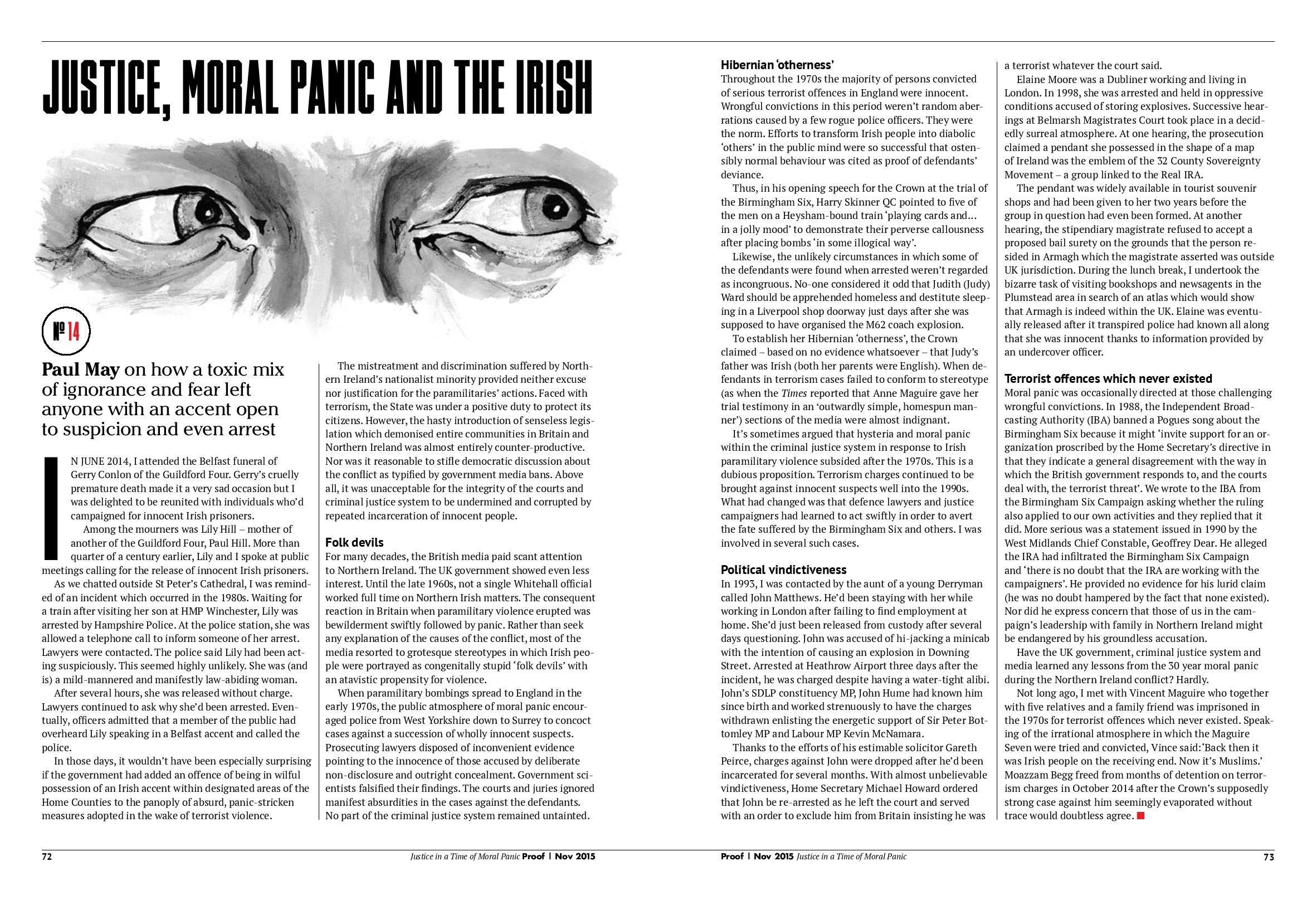
Something good has to come of this Simon Warr
In Memoriam Noel Hartnett David Rose
I don’t want to see new myths replace old Alison Saunders
Savile, Bryn Estyn & the danger of modern witch-hunts
Mark Barlow and Mark Newby
Justice cannot be time-limited Richard Scorer
Victim or complainant? Researching historic abuse allegations
Mark Smith, Steve Kirkwood, Clare Llewellyn, and Ros Burnett
Innocent until proven dead Susanne Cameron-Blackie
Victimology and ‘justice as therapy’ Barbara Hewson
The abuse pendulum Peter Garsden
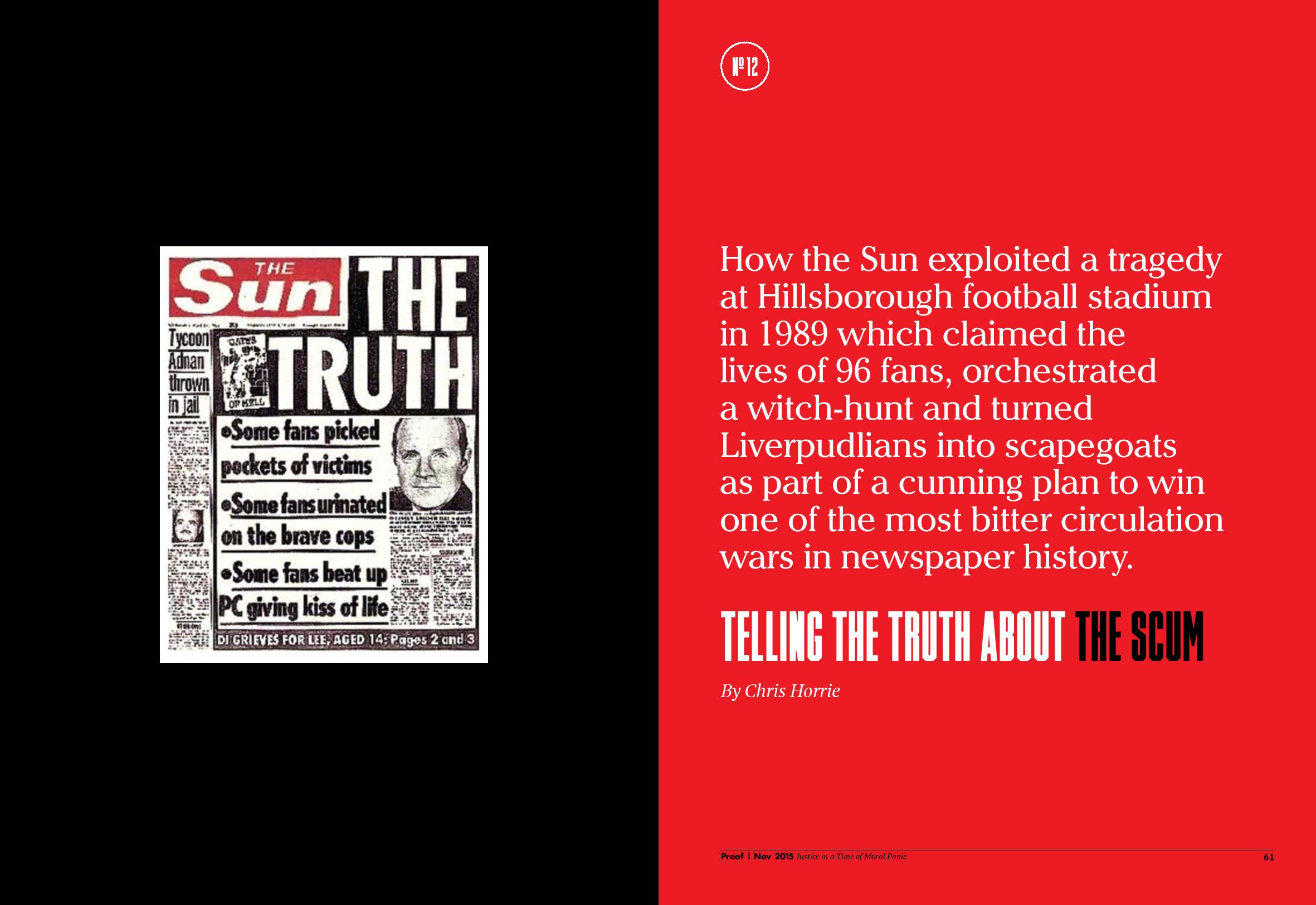
Thinking the unthinkable Dennis Eady
‘Jihadi John’: how to make a moral panic Alan Grattan
Telling the truth about the scum Chris Horrie
Institutionalising miscarriages of justice Bob Woffinden
Justice, moral panic and the Irish Paul May
The ricin ‘terror plot’ that never was Fiona Bawdon
Does the press really need to depict kids as monsters? Penelope Gibbs
‘A BOOK THAT INFORMS, SHOCKS AND DEMANDS A RESPONSE. IT DEMANDS JUSTICE’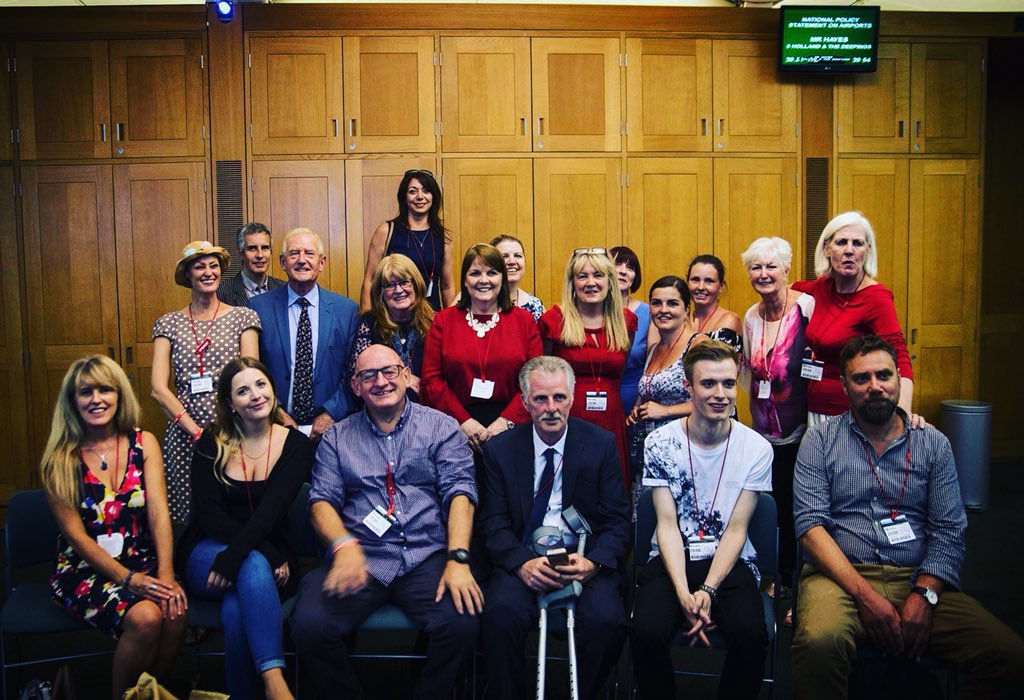
The picture was taken at the Westminster launch of Guilty Until Proven Innocent
From the introduction to Guilty Until Proven Innocent (Biteback, 2018)
When a miscarriage of justice case hits the headlines, it is easy to dismiss it as a shocking one-off aberration – a minor hiccup in a system that otherwise functions in an exemplary fashion. After all, we are told by politicians and lawyers that our criminal justice system is the nest in the world.
In reality, our justice system is in a state of permanent crisis. Our dilapidated courts are falling apart. It’s not just that paint peels off the courtroom walls and the roofs leak; inefficiency has become endemic. More than half of criminal trials in this country have to be called off or rescheduled. In 2015, some 1,200 Crown Court trials were unable to start as scheduled because the private companies contracted to escort prisoners to court failed to deliver the defendants on time. According to the spending watchdog, the National Audit Office, the Crown Prosecution Service spent £21.5 million that year on preparing for cases that were never heard.
Austerity has hit the criminal justice system hard. The Ministry of Justice’s budget, which covers prisons, probation and the legal aid system, will have been slashed by 40 per cent since the coalition government came to power in 2010 by the end of the decade. That is a cut from £9.3 billion in 2010/11 to a predicted £5.6 billion by 2019/20. 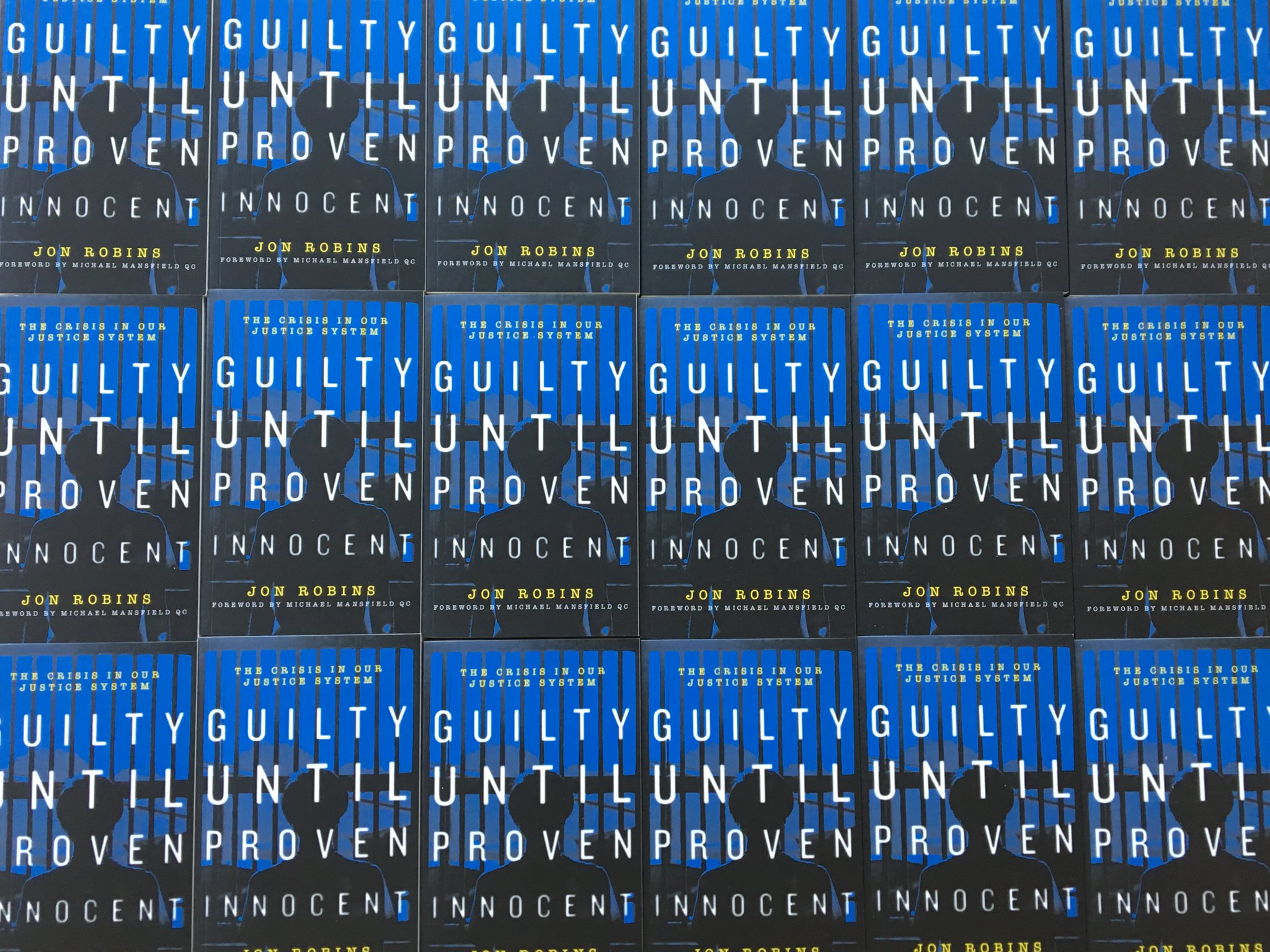
Our courts operate on a ‘two-nation’ system. There is ‘the wealthy, international class’ who opt to settle their cases in London with its ‘gold standard of British justice’. And then there is everyone else. The rest of us have to put up with ‘a creaking, outdated system’.
at is not the confected outrage of some vested interest with an axe to grind. It is the assessment of a recent Lord Chancellor.
‘I have heard too many accounts of cases derailed by the late arrival of prisoners, broken video links or missing paperwork,’ said Michael Gove in 2015, in his first speech as Lord Chancellor. The politician observed for himself lawyers arriving in court with their huge bundles of paper, describing the large stacks with typical flourish as ‘snowdrifts of paper held in place by delicate pink ribbons’, and wondered what century our courts were living in.
Gove did not last long in the post. Lord Chancellors don’t these days. There have been six in the past six years. The problems that he rightly identified, however, have only got worse.
A no-holds-barred insight into the serious and often overlooked miscarriages of justice that stalk our broken criminal justice system. Robins shines a light on the problems within criminal justice, and incisively exposes how easily and cheaply our founding principles of justice are cast aside.
The Big Issue, The Secret Barrister (Best summer read)
‘Some of our reforms will be controversial,’ Tony Blair told Labour Party conference delegates in 2002, ahead of the launch of his criminal justice White Paper. The then Prime Minister promised to ‘rebalance’ our justice system, so that the rights of suspects did not outweigh the rights of ‘the law-abiding majority’.
In his conference speech, Blair sought to rede ne what we understand by ‘miscarriages of justice’. Perhaps, he suggested to the party faithful, ‘the biggest miscarriage of justice’ in today’s system is ‘when the guilty walk away unpunished’.
Of course, Tony Blair’s speech was not controversial in the slightest. It now takes a brave politician to speak out in defence of the rights of defendants in this climate.
At the start of 2018, a series of high-pro le rape cases collapsed over a two-month period because of failures to disclose evidence. In the high- pro le case of Liam Allan, the police had downloaded 40,000 text and WhatsApp messages from the woman’s phone. Allan’s lawyers had repeatedly asked for the data to be handed over to them before the trial. Instead, they were assured there was nothing to disclose. e messages were nally released three days into Allan’s trial. is wealth of evidence revealed that his accuser had pursued the 22-year-old psychology student for (her words) ‘casual sex’.
A miscarriage of justice was narrowly avoided. Allan had been on bail for nearly two years. It was the prosecution counsel who insisted on the defence seeing all the evidence three days into the trial at Croydon Crown Court. ‘The system nearly failed,’ the barrister said. ‘ is is a criminal justice system which is not just creaking, it’s about to croak.’
As a result of this and a run of similarly collapsed cases, the Metropolitan Police dra ed in more than 100 officers to review 600 rape and sexual assault cases. An unreserved apology has been extended to Allan.
This is not a one-off. The number of prosecutions in England and Wales that have collapsed due to a failure by police or prosecutors to disclose evidence has increased by 70 per cent in the past two years. Meanwhile, the miscarriage of justice watchdog reports that failures in disclosure are the biggest cause of wrongful convictions.
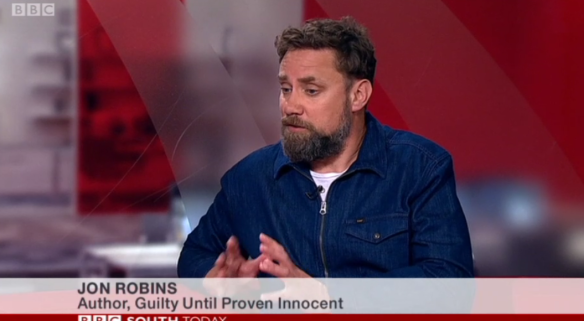
On the six o’clock news on BBC South the day that Guilty Until Proven Innocent was published
The Director of Public Prosecutions, Alison Saunders, was asked if it was possible that there were people in prison today because of failures of disclosures. Apparently, there is nothing to worry about.
Once again, Jon Robins, in his groundbreaking and persistent work, has performed the vital task of pinpointing where the justice system is continuing to fail.
Michael Mansfield QC
On 14 March 1991, Paddy Hill, Hugh Callaghan, Richard McIlkenny, Gerry Hunter, Billy Power and Johnny Walker left the Old Bailey. They were finally free, having spent sixteen years behind bars after their convictions for the murder of twenty-one people, as a result of bombs placed in two Birmingham pubs in November 1974, were overturned.
Set up on the very day that the so-called Birmingham Six were released, a royal commission was tasked with repairing the battered reputation of British justice. at scandal had exposed a mindset at the top of the judiciary that valued maintaining the appearance of integrity over the lives of individuals destroyed in the rush to judgment.
It was a view most infamously articulated by Lord Denning. Then Master of the Rolls, Denning ruled in 1980 that there would be no further appeals in the Birmingham Six case. ‘If they won,’ he said, ‘it would mean that the police were guilty of perjury; that they were guilty of violence and threats; that the confessions were involuntary and improperly admitted in evidence; and that the convictions were erroneous. at was such an appalling vista that every sensible person would say: ‘It cannot be right that these actions should go any further.’
It was a position that Denning did not resile from even in retirement. Historian A. N. Wilson asked him in 1990 whether he was glad that the death penalty had been scrapped. ‘Not really,’ the esteemed judge replied. ‘It ought to be retained for murder most foul. We shouldn’t have all these campaigns to get the Birmingham Six released if they’d been hanged. They’d have been forgotten, and the whole community would have been satisfied.’
All ‘systems’ make mistakes. No sensible person would be surprised that one so complex, chronically underfunded and dependent on other autonomous but similarly cash-starved agencies as British justice would from time to time err. A willingness to acknowledge fallibility, as well as being the decent and humane thing to do, is the right thing to do.
From the Birmingham Six to the 1989 Hillsborough football stadium tragedy, extreme institutional denial of the justice system has done more to undermine public confidence than the begrudging confirmation that the police really did beat confessions out of innocent Irish men or, in the case of Hillsborough, falsely made out grieving football fans to be drunken, ticketless louts who invited tragedy upon themselves.
It took the Hillsborough families twenty-eight years to get their measure of justice in the form of the 2016 inquests, which ruled that the ninety-six fans were ‘unlawfully killed’.
Like many people, all these years later, I can still recall the moment I first saw those distressing television images of Hills- borough stadium on the afternoon of Saturday 15 April 1989.
I come from a family of Liverpool FC fans. My father and brother were both at the match. My mother and I endured a long wait before discovering that they were OK. Then there was further anxiety until we heard news about my brother’s friend, who had travelled with them. Ray was one of the lucky ones. He managed to extricate himself from the Lepping Lane stand and climbed over the fencing to the adjoining pens.
On 29 September 2016, I interviewed Margaret Aspinall, chair of the Hillsborough family support group at Liverpool FC’s ground. Her eighteen-year-old son James died in the stadium disaster. ‘Even now it feels raw,’ she told me. ‘He goes off to a football game and he comes back ve days later in a co n. You need answers.’
In the background as we spoke, the Kop boomed out ‘You’ll Never Walk Alone’. It was playing on a fifteen-minute loop over the Anfield speaker system, for the benefit of fans from all over the world who were touring the hallowed ground.
The Hillsborough families had a community behind them. ‘That is why we have to try and change things,’ Margaret Aspinall told me. ‘No parent should have to go through what we did alone.’ There are many families out there fighting for justice on behalf of loved ones. Their campaigns do not have the critical mass of the Hillsborough campaign – they go it alone.
A bleak and often Dystopian picture of British justice… . It’s difficult not to be perturbed when seeing just how badly the justice system is failing.
Oliver Subhedar, Socialist Lawyer
Much of this book was written in the year of the twentieth anniversary of the Criminal Cases Review Commission (CCRC). The most concrete of 350-plus recommendations of the royal commission, set up on the day the Birmingham Six were released, was its proposal to create the first state-funded miscarriage of justice watchdog.
If you are in prison for a crime you have not committed, and you have unsuccessfully appealed, then your one and only chance of clearing your name resides with the Birmingham-based CCRC. It alone has the power to refer your case back to the Court of Appeal.
On average the CCRC receives 1,500 applications a year, mainly from prisoners. In the year of writing, the miscarriage watchdog referred just twelve cases back to the Court of Appeal.
The commission, oversubscribed and understated, is just another symptom of a failing criminal justice system. It is no coincidence that the system’s so-called safety net mechanism has suffered more under austerity than any other agency.
In 2016, the CCRC’s chair, Richard Foster, told MPs that for every £10 that his predecessor had to spend on a case a decade ago, he now had just £4. at represented the deepest cut that had taken place anywhere in the justice budget.
Almost as soon as the CCRC was set up, it was undermined: first by politicians and then by the Court of Appeal.Many lawyers and academics would say that the Court of Appeal has changed little since those bad old days.
A powerful and timely critique of a system in the grips of crisis.
Barry Sheerman MP, chair of the House of Commons’ APPG on Miscarriages of Justice
Guilty Until Proven Innocent is about miscarriages of justice (but not of Tony Blair’s kind). Each chapter starts with a different case of alleged wrongful conviction. The purpose of the book is to explore the common ground between the cases, all quite different and unique, in an attempt to shine light on why the criminal justice system keeps failing us.
This book is the work of a journalist, not an academic or a lawyer, although it is influenced by the debate in legal and academic circles. ere is a small constituency of concern comprising lawyers, academics, journalists and campaigners that has mobilised around miscarriages of justice.
Many of them have written for the Justice Gap website, taken part in the House of Commons’ justice committee 2015 investigation into the CCRC, and are currently involved in the formation of the all-party parliamentary group on miscarriages of justice. I have been influenced by their work in writing this book (but the book is an entirely independent enterprise).
The book is not arranged thematically, but I examine the following big issues:
- There is no adequate safety net. The Court of Appeal continues to fail to get to grips with miscarriages of justice.
- There is no effective watchdog. The CCRC is so chronically underfunded and overwhelmed that it fails to do the job it was set up to do.
- These are hidden problems. The creation of the commission has usurped the role of others who previously investigated miscarriages of justice and, as a result, this failure of our justice system has gone largely unreported. As a result of a two-decade pay freeze on legal aid, very few lawyers are willing to undertake appeal work. Similarly, the media (with honourable exceptions) have largely given up on miscarriage cases. I began this introduction by saying: ‘Whenever a miscarriage of justice case hits the headlines…’ The reality is that they very rarely do.
- We have little meaningful ‘open justice’. There remain huge problems with disclosure and access to evidence, and more generally a lack of accountability on the parts of the courts and legal profession.
- Failures in policing persist. Tunnel vision, police misconduct and allegations of corruption feature in many of the cases included in this book.
- Poor legal defence. The inevitable consequence of the crisis in legal aid is that many defendants suffer as a result of in competent legal representation.
- Inexpert evidence. Courts are often over-reliant and misled by flawed expert evidence. Prior to the CCRC, there were clear types of cases (terrorism, unreliable identifications, police misconduct etc.) that came to redefine in people’s minds what a ‘miscarriage of justice’ was.
Over the past twenty years there have been clear categories of miscarriages of justice (‘joint enterprise’ convictions, especially in the context of gang and knife crime, junk science cases and historical sexual abuse cases). But they are less well understood by the public. As I said, each chapter features a different case. Each one is complex. They are not black and white.
Jon Robins’ powerful and timely critique exposes the catastrophic failings in the underfunded criminal justice system, that sends innocent people to jail, and how that injustice is compounded by the failure of the Criminal Cases Review Commission (CCRC) and the Court of Appeal to correct those wrongs…. . It is a book that informs, shocks and demands a response. It demands justice.
Catherine Baksi
One day in March 2015, I found myself sitting in the lounge of a married couple. They had been through a hellish experience.
The husband had spent twenty months in prison for crimes he always insisted he had never committed. He was convicted of offences relating to historical sexual abuse allegations. Miraculously, the couple had come out the other side intact.On his first night in prison, the husband had contemplated taking his own life. He had a heart condition and had recently had a stent fitted in his upper thigh to regulate the ow of blood. He planned to take the plug out and ‘lie there; quietly bleeding to death’.
But, he insisted, he had had it easy compared to his wife. One day she was sitting outside school in her car, having just picked up their seven-year-old son. She was about to pull away from the kerb when the mother of one of her son’s friends came over. Her window was open and the woman punched her in the face. As she walked away, she keyed the side of her car.
All the time, their son sat behind his mother with his seatbelt on.
Her husband is now a free man because of the hard work of a loving wife, who refused to give up despite what must have seemed an impossible fight. His conviction was quashed in the Court of Appeal.
As I sat down on their sofa, I placed my iPhone on the table ready to record. e interview had been cancelled and then rescheduled. The husband didn’t want to talk to the press. His wife believed it was important that they did. She wanted to tell other people in their position that they weren’t alone.
So I hit ‘record’. I sense there is something he wants to say before we start. There is. ‘As a society, we accept that there are miscarriages of justice and that there has to be collateral damage,’ he tells me. ‘For every eight people who get sent to prison in relation to these types of allegations, two might be innocent. They are the collateral damage.’
*
Over the past couple of years, there has been a surge of interest in the topic of miscarriages of justice. Curiously, this renewed interest has had nothing to do with the deepening crisis in the justice system, and everything to do with the success of Amer- ican documentaries into cases of alleged wrongful conviction.
The best of these programmes was the Netix hit Making a Murderer, which documented the plight of Steven Avery of Manitowoc County, Wisconsin, who spent eighteen years in prison for a sexual assault that he did not commit.
Two years after Avery’s release, and having just led a $36 million lawsuit, he was arrested for murder. What followed over ten episodes was an unsparing dissection of what looks like some pretty rough justice. Thee two lm-makers, Laura Ricciardi and Moira Demos, spent ten years working on the series.
As you reach the climax of Avery’s story, one of his lawyers, the wise and eloquent Dean Strang, using words that resonate on this side of the Atlantic, delivers the following impromptu soliloquy on the limits of American justice:
Most of what ails our criminal justice system lies in an unwarranted certitude on the part of police officers, and prosecutors and defence lawyers, and judges and jurors, that they’re getting it right. That they’re simply right. It is just a tragic lack of humility.
This book is dedicated to our justice system’s collateral damage.